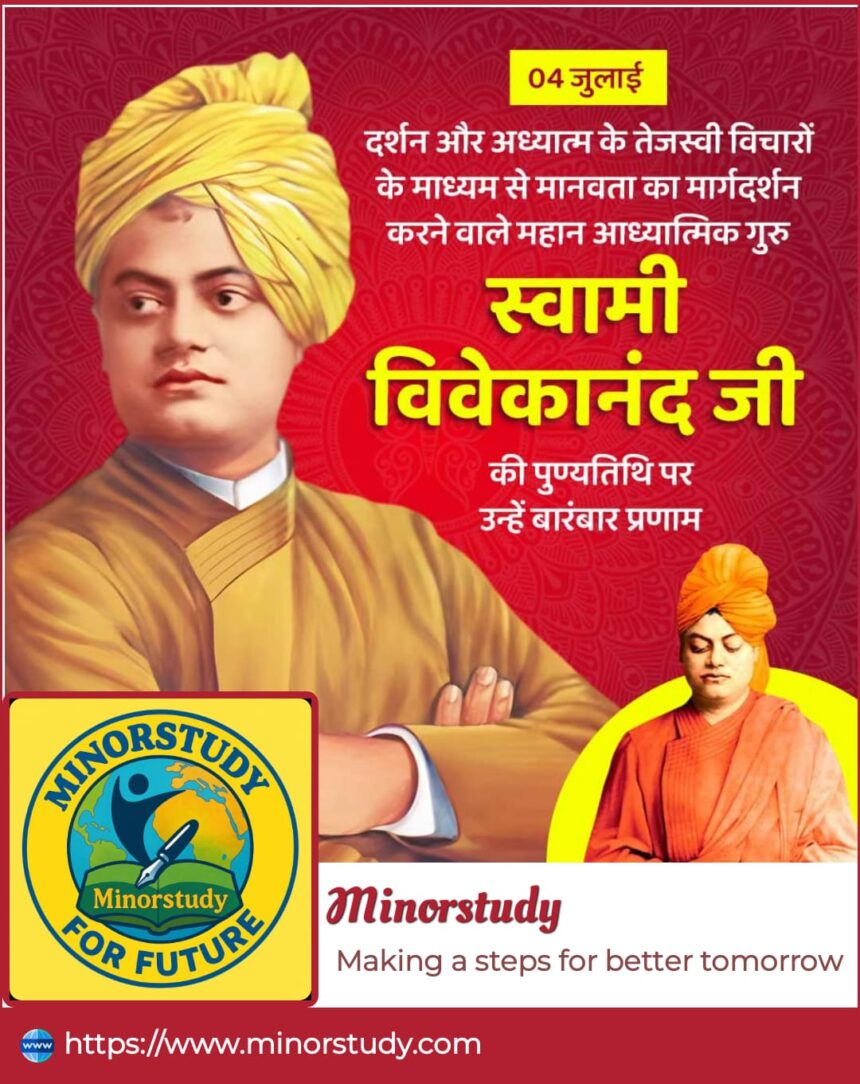9 Timeless Lessons from Swami Vivekananda’s Life – A Powerful Legacy That Still Uplifts the World
On the death anniversary of Swami Vivekananda ji—a towering sage whose vision reshaped modern spirituality and nationalism—it becomes our sacred duty to bow in reverence. His words weren’t just speeches; they were awakenings. His life wasn’t just a journey; it was a light for humanity.
- 📜 Who Was Swami Vivekananda?
- 📅 Timeline of Swami Vivekananda’s Life
- 🧠 9 Timeless Lessons from Swami Vivekananda
- 1. “Arise, awake and stop not till the goal is reached.”
- 2. Spirituality is not escapism
- 3. Faith in oneself is the cornerstone of growth
- 4. All religions lead to the same truth
- 5. Education is the manifestation of perfection already in man
- 6. Work is worship
- 7. Strength is life, weakness is death
- 8. India’s spiritual strength will awaken the world
- 9. Love and service to humanity is real religion
- 🧾 Historical Background
- ❓ FAQs About Swami Vivekananda
- Q1. Why is Swami Vivekananda so popular?
- Q2. What was his biggest contribution?
- Q3. How did Swami Vivekananda die?
- Q4. What are some of his key books?
- Q5. How is his death anniversary observed?
- 🌍 Significance in Today’s World
- 🎊 Wishing on His Death Anniversary
- 📌 Important Points to Remember
- 🌱 Impact on Daily Life
- 🧘 Conclusion: A Soul Who Still Walks Among Us
Born in colonial India but influencing minds globally, Swami Vivekananda (1863–1902) was a spiritual torchbearer, a rationalist monk, and an ambassador of Vedanta to the West. His untimely death at just 39 years of age on July 4, 1902, left a void—but his timeless teachings continue to inspire millions.
This in-depth article explores his history, contributions, spiritual insights, timeline, facts, FAQs, and impact on modern society and daily life. With a warm, human-friendly tone, let’s reflect on why Swami Vivekananda’s life is a masterclass in human potential.
📜 Who Was Swami Vivekananda?
Swami Vivekananda, born Narendranath Datta in Kolkata on 12 January 1863, was a disciple of Sri Ramakrishna Paramahamsa and the founder of the Ramakrishna Mission. He is most renowned for his historic speech in Chicago in 1893, where he addressed the Parliament of the World’s Religions with the iconic words, “Sisters and brothers of America…”
He was a monk with a modern mind, effortlessly blending ancient wisdom with practical action, who tirelessly worked for the spiritual upliftment of humanity and the awakening of India.
📅 Timeline of Swami Vivekananda’s Life
| Year | Milestone |
|---|---|
| 1863 | Born as Narendranath Datta in Kolkata |
| 1881 | Meets Sri Ramakrishna Paramahamsa for the first time |
| 1886 | Ramakrishna passes away; Narendranath becomes Vivekananda |
| 1893 | Delivers the famous Chicago speech at the Parliament of the World’s Religions |
| 1897 | Founds the Ramakrishna Mission for spiritual and social service |
| 1899 | Establishes Belur Math as the headquarters of the Mission |
| 1902 | Leaves his mortal body on 4 July, at age 39 |
🧠 9 Timeless Lessons from Swami Vivekananda
1. “Arise, awake and stop not till the goal is reached.”
A rallying cry to break free from mediocrity and work relentlessly toward one’s goal. Personal development begins with self-discipline.
2. Spirituality is not escapism
He taught that true spirituality is not renunciation of the world, but deep involvement in it with detachment. Serve the world with your heart, but don’t be bound by it.
3. Faith in oneself is the cornerstone of growth
“You cannot believe in God until you believe in yourself.” His words are a call for self-confidence, especially for India’s youth.
4. All religions lead to the same truth
He emphasized religious tolerance, stating that all paths eventually lead to the Divine. This message holds global relevance even today.
5. Education is the manifestation of perfection already in man
True education, he said, is not about books but building character, instilling moral values, and awakening inner potential.
6. Work is worship
He redefined karma yoga (the path of action), stating that working selflessly for society is the highest form of devotion.
7. Strength is life, weakness is death
He urged Indians to break free from fear, inferiority, and dependence, and instead embody strength in thought and action.
8. India’s spiritual strength will awaken the world
Vivekananda believed that India’s contribution to the world lies in its deep spiritual vision, and encouraged rediscovering that identity.
9. Love and service to humanity is real religion
He practiced what he preached by establishing institutions for education, health, disaster relief, and upliftment of the poor.
🧾 Historical Background
India under British rule was suffering from a crisis of identity, economic exploitation, and cultural inferiority.
Swami Vivekananda’s spiritual nationalism inspired freedom fighters like Subhas Chandra Bose, Aurobindo Ghosh, and even Mahatma Gandhi.
His fusion of Vedantic philosophy and action paved the way for a new India—rooted in its past yet prepared for the future.
❓ FAQs About Swami Vivekananda
Q1. Why is Swami Vivekananda so popular?
Because he combined spiritual depth with social activism, East with West, and philosophy with practicality—making his teachings universally relevant.
Q2. What was his biggest contribution?
Bringing Indian spirituality to the global stage, inspiring national consciousness, and founding the Ramakrishna Mission—a movement of selfless service.
Q3. How did Swami Vivekananda die?
He died of natural causes (likely due to health issues) on 4 July 1902, while meditating. He had predicted he would not live beyond 40.
Q4. What are some of his key books?
Jnana Yoga
Bhakti Yoga
Karma Yoga
Raja Yoga
Lectures from Colombo to Almora
Q5. How is his death anniversary observed?
Devotees visit Belur Math, organize spiritual discourses, meditate, and read his works to honor his teachings.
🌍 Significance in Today’s World
Swami Vivekananda’s teachings are more relevant now than ever before:
In an age of anxiety—he taught inner peace.
In a world of intolerance—he preached universal brotherhood.
Amid distractions—he advocated self-discipline.
In materialistic societies—he reminded us of the divine within.
His life was a message to youth: You are not weak, you are not inferior. “The world is the gymnasium where we come to make ourselves strong.”
🎊 Wishing on His Death Anniversary
“On the divine occasion of Swami Vivekananda’s punyatithi, may we absorb his timeless wisdom, awaken our inner strength, and walk boldly toward truth, service, and self-realization.”
“Again and again I salute the monk who awakened not only India but the soul of the world.”
📌 Important Points to Remember
Born: 12 Jan 1863 | Died: 4 July 1902 (Age: 39)
Disciple of Ramakrishna Paramahamsa
Founder of Ramakrishna Mission & Belur Math
Known for Chicago 1893 speech
Advocated Vedanta, Yoga, and Karma Yoga
Inspiration behind National Youth Day (Jan 12)
🌱 Impact on Daily Life
His emphasis on self-confidence encourages personal growth.
His teachings on tolerance can heal societal divisions.
His stress on education and values can reform schooling.
His work ethic and spirituality offer balance in modern life.
You don’t need to be religious to learn from Vivekananda. You just need to be human.
🧘 Conclusion: A Soul Who Still Walks Among Us
Swami Vivekananda did not die on 4 July 1902. His physical body may have passed, but his soul still guides those who seek truth, strength, and service.
His death anniversary is not a day of mourning—but a call to rise, to live a life of integrity, inner power, and global love. His life reminds us: “Be not afraid. Believe in yourself. Serve others. Realize God.”
Let his memory not be confined to textbooks or speeches—let it flow into our actions, thoughts, and every heartbeat that dares to dream of a better world.








